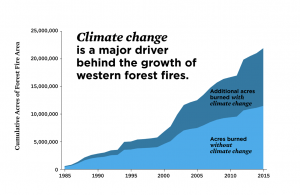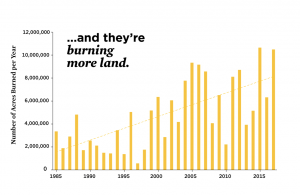by Mariana Orozco, guest blogger
If you went to California’s oldest state park right now, you would probably find many trucks logging trees and trees that have been chopped down. This is the result of one of the many wildfires that have happened in parts of Washington, Oregon and California this year. Although the wildfires were sometimes started by lightning or by humans on accident, climate change is deepening the effect of the fires. The fires are larger, more intense, and harder than usual to put out, causing many Californians to evacuate their homes.
The Role of Climate Change
It is important to point out that wildfires are not unusual to Californians. They usually occur annually during the summer and fall. Due to rising temperatures from climate change, more moisture evaporates from the ground, dries the soil, making the vegetation more flammable. Not only are the fires worse due to climate change, but the fires themselves worsen climate change by increasing CO2 emissions. Also, the forest pest infestations are also creating more tree deaths.

Due to climate change, weather patterns are shifting and the seasonal Fall rains are delayed. This year, it led to a very dry Summer and a windy Fall, making the fires more intense. The wind brings more oxygen to the fire, causing flames to spread over larger areas. With less precipitation in this arid climate and less snow due to rising temperatures, the soil and vegetation are becoming even more dry. There has also been an increase in extreme weather conditions, such as heat waves and lighting storms.
Social, environmental, and economic costs of the wildfires
People who had never been affected by the fires are now being forced to evacuate. To fight the wildfires, large financial assistance is required. Also, once communities are affected, more money is needed to rebuild them. Just to fight them, the federal government is spending an average of 2.4 billion dollars, which has more than doubled in the last 20 years. Not only are the number of wildfires increasing, but the effect on land is expanding as well. The number of acres burned is growing exponentially, with 100 more wildfires each year than the year before since 2015. With the continuous effect of wildfires, more wildlife is being destroyed, animals are being forced to relocate, and ecosystems are being damaged.

Impact on Native Americans
Many Native American people in California have been forced from their lands due to the fires. With them, they take their knowledge of taking care of the overgrown forests. In Karim territory, one of the largest indigenous tribes in California, people are taught to keep the area around their houses burned off. Char Miller, director of environmental analysis at Pomona College, states that removing millennia of knowledge from the land has resulted in the current wildfires. One of the ways Native Americans would keep the land healthy was through lighting fires on purpose to keep extra dry fuel from building up. California state and federal agencies are starting to collaborate with each other to prevent wildfires.
What can you do?
Society needs to cut carbon emissions to stop rising temperatures. We need to agree on a shift towards renewable energy and cut our reliance on fossil fuels. In order for this to happen, you can start by voting and advocating for candidates who have strong climate change policies. In Washington, Oregon, and California, there have to be better building codes so that construction takes places away from fire prone areas. There needs to be a proactive approach by removing dead trees and planting new native species, in an effort to not harm the ecosystem. You can engage in more direct actions to reduce the effects of global warming. Things as simple as reducing your water waste, buying better light bulbs, eating less meat and throwing less food away, unplugging any electronics if they are not being used, and keeping your tires inflated can help stop global warming and reduce the effect of the wildfires in the future.

